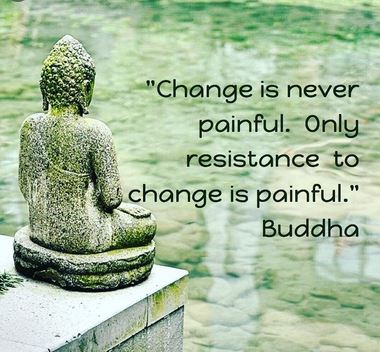This Too Shall Pass
The Blessing And The Curse Of Impermanence

The Mythical Story Of "This Too Shall Pass"
The origins of the saying "this too shall pass" are attributed to Persian Sufi poets, such as Rumi, Sanai and Attar of Nishapur and brought to modern attention by English poet Edward FitzGerald who was famous for his English translation of "The Rubaiyat of Omar Khayyam" in 1860.
The story is about a king who sought wisdom. He searched all over his kingdom for wisdom and did not find it.
Eventually he heard of a man living in a remote part of the kingdom who had a reputation for great wisdom.
The king sent for this man and had him brought to court, whereupon the king offered the man a great reward if he would share the secret to his wisdom. The man agreed and departed from the king’s presence.
He returned several weeks later and presented the king with a small box.
The king looked a little surprised and very disappointed as he opened the box and removed a ring.
“Is this it?” he shouted at the wise man.
“Place the ring on your finger and read the inscription out loud” replied the wise man.
The king read the inscription:
“This too will pass”.
The wise man counselled the king:
“Wear that ring that at all times and look at it frequently, and regardless of whether you are experiencing good fortune or adversity remind yourself that this too will pass…”
The king was satisfied that he had at last found true wisdom and he duly rewarded the man with great wealth.
How much time does it take before you can truly say "this too shall pass" and be able to move on?

When my daughter was at college studying for her first degree, she called me one night in a state of distress. She had split up with her boyfriend.
She said: "Dad I don't know what to do or how to cope with this?"
I asked her how she thought she would feel about the break up in 10 years time. She replied:
"I will be over and it will be history by then."
So I asked her how she would feel about the break up in one month's time.
"In one month I will be still be upset and hurting"
The conversation continued, and I narrowed the time-frames and she agreed she would have got over the break up and put it behind her at some point in the next 6 to 12 months.
So I advised her to work out a strategy to deal with her distress and feelings of loss. There are a number of models for doing this and I recommended the Kubler Ross model.
Societal assimilation
At a societal level, given the passage of enough time, societies assimilate and integrate and evolve beyond the traumas of war, invasion and conquest. The wounds do heal.
At time of writing with the Russian invasion and war with Ukraine this may sound insensitive and I don't mean it to.
But taking the long view of many generations, societies do move on. This process is inherent in the development of many nations states. In my home country, the United Kingdom, our history has gone through many iterations of invasion and assimilation.
The key point in both of these contexts is the importance of the passage of time.
Coping with the transition
The personal challenge is how to cope when you are lost in transition as you attempt to make your readjustment and realignment to the new realities of imposed change.
This Too Shall Pass - The Path To Healing

I once heard someone say: "Every relationship ends in tears...someone leaves, or someone dies...".
At the time I thought this was a deeply cynical thing to say, but now I am not so sure.
Shantideva the 8th century Indian Buddhist sage commenting on impermanence, and the innate reality that this too shall pass, said:
"The moment we are born, we have no freedom to remain for a single second.
We are running towards death, like a galloping horse.
We call ourselves ‘living beings’ but we are ear-marked for death. This is sad indeed. That is the reality."
In Ecclesiastes 3 in the Old Testament the preacher/teacher [alleged to be King Soloman] speaks of the seasonality of impermanence and declares that this too shall pass as he says:
"To every thing there is a season, and a time to every purpose under the heaven:
- A time to be born, and a time to die; a time to plant, and a time to pluck up that which is planted;
- A time to kill, and a time to heal; a time to break down, and a time to build up..
- A time to weep, and a time to laugh; a time to mourn, and a time to dance..
- A time to love, and a time to hate; a time of war, and a time of peace."
At times of great suffering and loss impermanence is felt as a curse. The loss of a loved one, a job and material comfort, the loss of status and reputation...these losses are hard.
The path to healing
The path to healing ultimately lies in the transforming power of acceptance.
There are situations where impermanence is a relief and a release, and this is especially true with our emotional and mental states.
Another key approach to dealing with suffering, loss and impermanence is to be found in the power of framing and learning how to change how you feel by changing the language you use to describe and talk about your losses.
In my personal experience, the practise of mindfulness is one of most effective remedies for reducing stress, gaining perspective and enabling us to realise the blessing that comes with the acceptance that with all things....this too will pass.
This Too Shall Pass...
I want to close this article with this beautiful song by Peter Himmelman "Impermanent Things".
Next Article: The Stories We Tell Ourselves
Return from "This Too Shall Pass"
to: Walking The Talk
Or to: What Is Spirituality?
LATEST ARTICLES
The Inner Weight of Shame - Sustained By Attentional Fixation
 A Mind That Is Continuously Engaged In Self-Surveillance. Shame is one of the heaviest inner burdens a human being can carry. It does not announce itself loudly or demand attention through drama. Inst…
A Mind That Is Continuously Engaged In Self-Surveillance. Shame is one of the heaviest inner burdens a human being can carry. It does not announce itself loudly or demand attention through drama. Inst…Does Prayer Work? The Psychology of Prayer, Meditation and Outcomes
 Reality Is A Complex System Of Countless Interactions - Including Yours. So does prayer work? The problem is that the question itself is usually framed in a way that guarantees confusion. We tend to a…
Reality Is A Complex System Of Countless Interactions - Including Yours. So does prayer work? The problem is that the question itself is usually framed in a way that guarantees confusion. We tend to a…Living in Survival Mode Without Surrendering Mental Authority
Living in Survival Mode Without Surrendering Mental Authority
 Clear Thinking When You’re Just Trying to Stay Afloat. Many people today are overwhelmed because they are living in survival mode - not temporarily, but as a persistent condition of life. For many, th…
Clear Thinking When You’re Just Trying to Stay Afloat. Many people today are overwhelmed because they are living in survival mode - not temporarily, but as a persistent condition of life. For many, th…Manifestation Without Magic: A Practical Model
 Manifestation without magic is not a softer or more intellectual version of popular manifestation culture. It is a different model altogether. Popular manifestation teachings tend to frame reality as…
Manifestation without magic is not a softer or more intellectual version of popular manifestation culture. It is a different model altogether. Popular manifestation teachings tend to frame reality as…Staying Committed When You Can't See Progress - The Psychology of Grit
 Uncertainty Is Not The Absence Of Progress, Only The Absence Of Reassurance. One of the most destabilising experiences in modern life is not failure, but uncertainty and staying committed when you can…
Uncertainty Is Not The Absence Of Progress, Only The Absence Of Reassurance. One of the most destabilising experiences in modern life is not failure, but uncertainty and staying committed when you can…The Battle For Your Mind - How To Win Inner Freedom In A Digital Age Of Distraction
 From External Events to Inner Events. We often think of “events” as things that happen out there: the traffic jam, the rude comment, the delayed email reply. But what truly shapes our experience is wh…
From External Events to Inner Events. We often think of “events” as things that happen out there: the traffic jam, the rude comment, the delayed email reply. But what truly shapes our experience is wh…How to See Your Thoughts Without Becoming the Story
 A Practical Guide to Thought-Awareness. You can spend your life inside the stories of your mind without ever learning how to see your thoughts clearly and objectively. Most of the stuff we tell oursel…
A Practical Guide to Thought-Awareness. You can spend your life inside the stories of your mind without ever learning how to see your thoughts clearly and objectively. Most of the stuff we tell oursel…The Collison Decision Matrix - A Simple Framework for Better Choices
 The Collison Decision Matrix Is A Practical Everyday Thinking Tool. Most of us spend a surprising amount of time worrying about decisions. From small ones such as what to wear, what to eat, what to te…
The Collison Decision Matrix Is A Practical Everyday Thinking Tool. Most of us spend a surprising amount of time worrying about decisions. From small ones such as what to wear, what to eat, what to te…The Power Of Asking The Right Question
 The Power Of Asking The Right Question Lies In The Quest For Insight. To experience the power of asking the right question you must develop the practice of asking questions. The best way to improve th…
The Power Of Asking The Right Question Lies In The Quest For Insight. To experience the power of asking the right question you must develop the practice of asking questions. The best way to improve th…Site Pathways
 Here is a site pathway to help new readers of Zen-Tools navigate the material on this site. Each pathway is based around one of the many key themes covered on this site and contain a 150 word introduc…
Here is a site pathway to help new readers of Zen-Tools navigate the material on this site. Each pathway is based around one of the many key themes covered on this site and contain a 150 word introduc…How To Live With Contradiction - Beyond Thought Let Stillness Speak
 A major impact on so many peoples' lives is the situational contradiction of unfilled realistic expectations. So where does all this leave us? Well here we are, with mental equipment that is more lim…
A major impact on so many peoples' lives is the situational contradiction of unfilled realistic expectations. So where does all this leave us? Well here we are, with mental equipment that is more lim…
